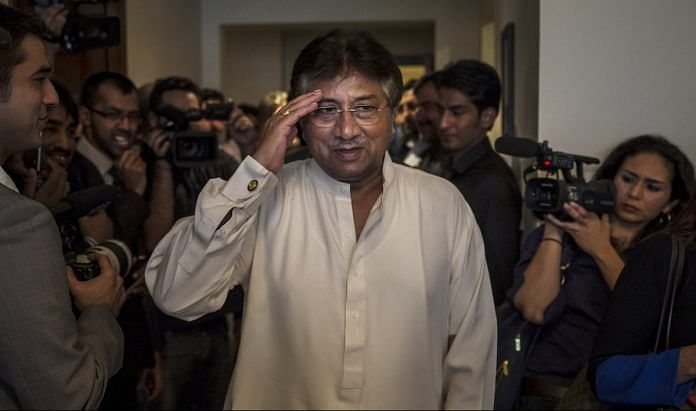General Pervez Musharraf has expressed fondness for the Lashkar-e-Taiba, and said he was the ‘biggest supporter’ of the group and its founder Hafiz Saeed.
Strategic circles in India and perhaps around the world appear to have been shocked by a recent interview given by former Pakistan President General Pervez Musharraf. He said that there was much mutual fondness between him and the Lashkar-e-Taiba (LeT), the internationally-branded terrorist organisation based in Pakistan.
General Musharraf went on to say that he was the “biggest supporter” of the LeT and its founder, Hafiz Saeed, and asserted that he backs the terror group’s role in “suppressing” the Indian Army in Kashmir. That a former President of Pakistan is admitting to this, and the fact he exploited the LeT to contest the Army of a neighboring country, is tantamount to a full admission of state-sponsored terror by Pakistan in J&K. Not that this needed any confirmation; it’s the timing that is interesting, as is the personality stating this.
There was a time, between 2003 and 2007, when India was negotiating with Musharraf, perceiving a change of heart in Pakistan. Backroom channels were abuzz for over four years after he declared a unilateral ceasefire along the LoC in November 2003. There was even talk of a mutual withdrawal from the Siachen Glacier, which mercifully was never accepted by the Indian Army brass. All this was on the basis of what appeared as a transformed General Musharraf looking for true peace, under the shadow of India’s outstanding leader, then-Prime Minister Atal Bihari Vajpayee.
What gives? Why is Musharraf cozying up to Hafiz Saeed now? The answer lies in the wide open spaces in Pakistan’s political scenario, where the Pakistan People’s Party (PPP) remains a shadow of its past, the Pakistan Muslim League (Nawaz) is in serious internal disruption mode after the ouster of Nawaz Sharif as Prime Minister, and Imran Khan’s Pakistan Tehreek-e-Insaf (PTI) hardly has the capability to go it alone.
This tempted Hafiz Saeed to launch his own political party, the Milli Muslim League (MML), to politically mainstream his rogue terrorist organisation, the Jamaat-ud-Dawa (JuD). The Pakistan Election Commission has yet to officially register the MML, but Yaqoob Sheikh and Liaqat Ali Khan of the MML contested by-elections in NA-120 (Lahore) and NA-4 (Peshawar) respectively as independent candidates; in fact, Yaqoob Sheikh even secured 5,822 votes.
A new organisation, Tehreek Labaik Ya Rasool Allah, which recently swamped the capital Islamabad demanding death sentences for PML-N ministers and the complete dismissal of parliament, has led the latest emergence of ideologically radical parties that have simultaneously surfaced in recent months. The waning political weight of centrist parties is going to be a major challenge going forward.
Musharraf is looking at this challenge as an opportunity. There have been reports of him attempting to patch together a combine of 23 parties of different hues, including the Muttahida Qaumi Movement (MQM) and the Pak Sarzameen Party. He has called this conglomerate ‘Pakistan Awami Ittehad’, but there can be no certainty that partners here will flock together when it comes to the elections next year. Besides, these are strange bedfellows, and the inclusion of parties such as MQM is a shot in the dark. With nothing having crystallised, Musharraf is seizing the moment of Hafiz Saeed’s release from detention in the fond hope that MML will probably fall in line to join his combine.
At the age of 74, Musharraf’s ambitions, the taste of power (with his background of having led Pakistan for over nine years, 1999-2008) and the relatively open space in Pakistan’s political labyrinth are all creating new complexities. It is hard to say which direction all this will take Pakistan in, even as the nation wrestles with issues concerning extremist violence on its streets.
While all this is pre-election machinations, Musharraf’s admission of employing and backing the LeT to fight the Indian Army appears to be opening potential links for future alliance. Does this have the backing of the Pakistani Army? It is quite certain that an admission by its former chief and President of Pakistan of supporting an Islamist organisation to achieve Pakistan’s strategic ambitions is not causing any embarrassment to it.
The Pakistani Army is a past master in handling this through its policy of denial and deft information handling. With supposedly moderate elements, former leaders, political opportunists and the army all in the fray for exploiting political Islam, how the cookie crumbles in Pakistan is anybody’s guess.



